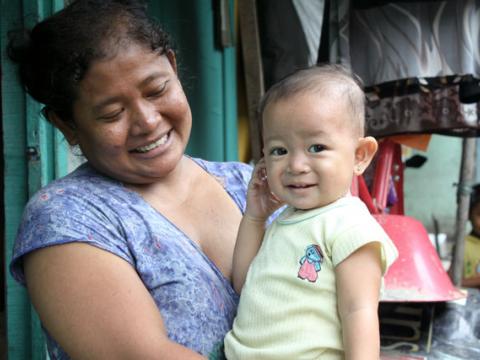Nuraini’s Success after Failure

By Bartolomeus Marsudiharjo, World Vision Indonesia communicator
Breastfeeding is easy for some women, but not for others. Nuraini, 31, has to wait until her third delivery to experience the beauty of exclusive breastfeeding.
When she was expecting her first baby, Nuraini determined that she would only feed her baby with her breast milk for six months. She only managed to breastfeed her first baby boy, Fadilah Fiki Saputro, now 9, for four months.
“Suddenly my breast stopped giving milk,” Nuraini says.
Nuraini tried again when her second child Farel Dwi Oktavianto, now 26 months, was born. The same thing with her first try happened.
As Nuraini tried to find solution to her problem, her husband Joko Aprianto and her mother-in law demanded that she feed Farel formula milk. “It is all right. But if you want to give Farel with infant’s formula, please provide the milk,” Nuraini told them.
Nuraini coordinated with World Vision’s health team in the field when she was expecting her first baby and even joined activities for pregnant woman.
She actively attends the monthly activities to learn how to monitor pregnancy, proper breastfeeding and how to give the good nutrition to babies under five. “I now know about mother and child health, healthy nutrition, and children growth,” says Nuraini.
With this knowledge about mother and child health, she kept trying to breastfeed her third baby even if she failed in her first and second attempts.
The third time did not come easy. A few days after her third baby girl Putri Nur Octaviani was born, Joko and her mother in law persuaded her to feed Putri with banana.
When Joko tried to convince her, she told him Putri's “intestines are not ready for bananas”.
Nuraini explained to her husband the importance of exclusive breastfeeding as husband struggled to understand her. All her efforts and patience eventually succeeded. She was able to breastfeed Putri until she has reached six months.
She said it was also convenient. “If Putri is hungry in the middle of the night, I simply breastfeed her, no need to prepare bottle milk,” she says. “Putri saved us from expenses, I don’t need to buy bottle milk for her,” Nuraini adds.
“Putri has never been sick. She fever few times and after I gave her medicine as advised by our mid wife, she recovers quickly,” Nuraini says. She believes Putri is in good health due to exclusive breastfeeding.
“Two of Purtri older brothers often got sick,” she says, comparing the health conditions of her children. Nuraini is lucky to live in the urban city, so she can easily find a community health post when her children get sick.
A junior high school graduate, Nuraini now works as a daily helper for another family - washing and ironing the family dresses and t-shirts. She gets very low monthly payment for the work, around 250,000 rupiahs (US$30). Her husband works as a scavenger and rarely goes home. If he goes home, he does not provide for his family.
With her small income, Nuraini and her three children have no choice but to stay with her mother and her younger brother in their very small house. Nuraini does not keep her knowledge for herself. She happily shares with others.
When her neighbor Ika Sari Dewi, 26, delivered her first son a few months ago, Nuraini shared a video on a DVD she got from World Vision containing instructions on how to breastfeed properly.
Nuraini diligently attends monthly activities of the integrated health post, where she could be assisted to monitor her children’s health and avail of free immunization. Midwife Tio says she Nuraini would always help prepare vaccines when she attends the activities.
“If a mother brings her children to the integrated health post, I guarantee that the children will get all immunization recommended by the government,” says the midwife Tio. The midwife also gives advise to pregnant mothers to visit midwives or doctors.
“Don’t wait to visit midwife or doctor only when the delivery is approaching,” she always says during a meeting in the integrated health post.
The Global Week of Action for Child Health Now will be held from 13 to 20 November. World Vision needs every leader to not only participate, but to influence staff to join the global mobilisation to call on world leaders to meet the commitments they have made to reduce child mortality and improve maternal health (Millennium Development Goals 4 and 5). Please say ‘Count Me In – I want Children to Survive 5!’ For more details, please visit http://www.childhealthnow.org/.